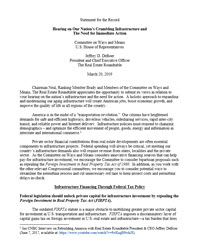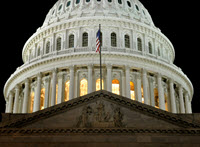Repealing FIRPTA, streamlining permit procedures and passing infrastructure financing measures will help spur infrastructure improvements and contribute to economic growth, according to recommendations submitted this week by The Real Estate Roundtable to the House Ways and Means Committee. (Roundtable Statement for the Record)
 |
Repealing FIRPTA, streamlining permit procedures and passing infrastructure financing measures will help spur infrastructure improvements and contribute to economic growth, according to recommendations submitted this week by The Real Estate Roundtable to the House Ways and Means Committee. (Roundtable Statement for the Record) |
The Roundtable recommendations include the following:
DeBoer discussed the role of public-private partnerships to develop infrastructure projects on CNBC’s Squawk Box in June 2017. “There’s a lot of capital that wants to invest in infrastructure,” DeBoer said. (Roundtable Weekly, June 9, 2017).
Ways and Means Chairman Richard Neal (D-MA) has indicated he intends for his committee to consider an infrastructure bill this spring.
Legislation to reform the taxation of carried interest was introduced on March 13 by Sen. Tammy Baldwin (D-WI) and House Ways and Means Committee member Bill Pascrell, Jr. (D-NJ). (News releases: Baldwin and Pascrell)
 |
Legislation to reform the taxation of carried interest was introduced on March 13 by Sen. Tammy Baldwin (D-WI) and House Ways and Means Committee member Bill Pascrell, Jr. (D-NJ). |
The Real Estate Roundtable opposes proposals such as the Carried Interest Fairness Act. General partners earning a carried interest in a real estate partnership bear significant risks beyond direct capital contributions. These risks can include funding predevelopment costs, guaranteeing construction budgets and financing, and exposure to potential litigation over countless possibilities.
Roundtable President and CEO Jeffrey DeBoer yesterday discussed the organization’s national policy priorities in the current Congress with Roundtable Board Member Holly Neber (CEO, AEI Consultants and President, CREW Network) during the 2019 Connect Los Angeles conference. (Watch video of DeBoer’s discussion, March 21)
 |
RER President and CEO Jeffrey DeBoer yesterday discussed the organization’s national policy priorities in the current Congress with Roundtable Board Member Holly Neber during the 2019 Connect Los Angeles conference . |
The policy discussion, “What’s Next!? What’s Happening in Washington and What Does it Mean for Your Business?” explored topics such as terrorism, infrastructure, foreign investment and tax reform before a standing-room only crowd of more than 500. (Video, LA Connect)
The Roundtable released its 2019 National Policy Agenda during its January State of the Industry Meeting in Washington (Roundtable Weekly, Feb. 1).